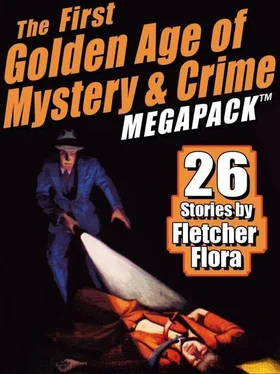The voice had told her so, the very first time it had spoken to her, at the same time she had first become aware of Hugo Weis as a monstrous evil. She had been critically ill, had endured extreme fevers, and after her illness there was nothing much to do during a long recuperative period, except to think and read and wait for the long days and nights to pass, and on the morning of this particular day she had opened a newspaper that had been brought to her room by her mother, and there on the front page was a picture of Hugo Weis. She had known about him before, of course, for everyone knew about Hugo Weis, but it was the first time she had ever seen a picture of him, or at least the first time she had ever been really aware of seeing one. He was being investigated by a grand jury for his connections with a vice ring, supposedly international, and there under the black banner of the story was this picture. Only his head and shoulders were shown, and the picture must surely have been blown up from a shot snapped on a street or somewhere by an alert photographer, for Hugo Weis never would have sat for a studio portrait or have voluntarily permitted his picture to be taken anywhere.
He was incredibly ugly, which was not in itself anything to condemn him for, but his ugliness was abnormal, almost terrifying. His face, she thought, was a gross obscenity. Sitting there in her room and staring at the picture, she had studied intently the flat nose with exposed nostrils like black holes burned through the flesh, the mouth like a raw sore about to bleed, the coarse skin pocked by disease. The eyes were almost completely hidden behind lowered lids. She felt in her own flesh a cold and subtle crawling, and she wondered how a man so monstrously marked by evil ugliness could have acquired in his way so much power over other men. It was then, as she wondered, that the voice spoke to her for the first time.
“Hugo Weis must die,” the voice said, “and you must kill him.”
She had known instantly that it was no hallucination. The voice was real. She could hear it. It spoke clearly and softly from a point just behind her right ear, and it would have been futile to try to convince herself, even if she had wanted to, that it was no more than an echo of her own thoughts. And so, after the first shock of fear and wonder, she accepted the voice quite calmly, almost as if she had been expecting it unconsciously all these years, had been waiting for it to come.
“Why is it I who must kill him?” she wondered.
“Because it is you who have finally answered me.”
“Will no one else listen?”
“It’s not a question of listening. It’s a question of hearing.”
“Am I, alone in all the world, the only one who can hear you?”
“You are the first, at least.”
“What gives me the power to hear you, and you the power to make me hear? Has my recent illness had anything to do with it?”
“I don’t know the answer to your questions. What is the explanation of any miracle, except that it is not a miracle at all, but only the rare effect of natural causes we don’t understand? I speak and you hear and that’s enough.”
“Who is speaking to me?”
“I can’t tell you.”
“Why?”
“Because I don’t know that, either. I am, as a voice, merely the expression of an unconscious imperative. I express the imperative, but I can’t have knowledge of the source from which it has sprung.”
“I’m not sure I understand.”
“Never mind. I’ll speak to you again later.”
That was the beginning of her relationship with the voice. She had never thought about killing anyone before, and it was truly remarkable how she had been able to begin thinking about it, with a kind of detached serenity, as if it were someone else thinking and planning, someone else entirely who listened to the voice and lived at ease with thoughts of violent death. There was apparently no hurry, however. The voice did not urge her or force her to commitments she was not prepared to make. She began in a rather leisurely way to gather all the information she could find on Hugo Weis, and there was very little to be found and still less to be relied upon, for Hugo Weis was elusive, preferring to operate through others while remaining in the heavy shadows of obscurity. He was the son of a laborer. By cunning, treachery and Machiavellian ruthlessness, all working through a strangely compelling personality in an ugly, stunted body, he had made himself the greatest power in the state. He controlled the city in which he lived. He controlled the governor of the state and most of its lawmakers. There were men of consequence in Washington who listened carefully when he spoke. And he spoke always in whispers, behind his hand. The grand jury investigation never came to anything, of course. One witness died in unusual circumstances, another lost his memory, and another disappeared. In any event, it was doubtful that an indictment would have been returned.
It was in the spring that it all began, and that summer the voice kept returning, speaking to her when it pleased, with no consistency of time or place. In the fall, she resumed her duties as teacher of a sixth grade class in an elementary school near her home, and occasionally the voice visited her during school hours, which some times turned out to be embarrassing. It was necessary to become instantly quite still in order to hear what the voice said, it spoke so softly, and these periods of sudden withdrawal, in which she sat or stood as immobile as stone in an attitude of intent listening, were noticed, naturally, by the students. She was afraid that she was gaining a reputation of being odd, but it was impossible to explain that her apparent lapses were actually quite normal and necessary, for no one would have understood, and after awhile she found that it no longer mattered what anyone thought about her.
By this time there was no doubt, if there had ever been any, that she would eventually kill Hugo Weis. She did not feel messianic about it. It was simply something that had to be done. For awhile the possible consequences to herself were disturbing, even frightening, but soon she found herself unable to think beyond the act of killing, as if her own life would also end in that instant and make her eternally invulnerable to earthly harm. It amused her at night, lying in her bed in her dark room, to think of Hugo Weis, wherever he was, doing whatever he might be, completely unaware that he would surely soon die by the hand of a woman he had never seen and would never really know. It was amusing, very amusing, and she laughed softly to herself in the darkness, a whisper of sound in the still room. The face of Hugo Weis floated above her like an ectoplasmic obscenity, ugly and evil.
In March she bought a gun, a 32 caliber revolver, explaining to the local hardware dealer from whom she bought it that it would give her a sense of security, even though she had never fired a revolver in her life. Since she and her mother lived alone in a large house, she said, it seemed unwise to be without any kind of protection at all. The dealer agreed and suggested that she practice firing the revolver in the country Sunday afternoons. He sold her several boxes of cartridges for the revolver, and she carried the revolver and the cartridges home and put them away carefully in a drawer of the dressing table in her room. She did not practice firing the revolver Sunday afternoons, however, for it wasn’t necessary. Whatever was necessary would be taken care of in its own time.
Early in June, soon after school was let out for the summer, the long period of waiting came to an end. It ended abruptly, without warning, one afternoon in the reading room of the public library. Freda had gone there for no particular reason, except that the public library was a pleasant place to be, quiet and restful with sunlight slanting in through high windows, and she had been going there regularly for almost as long as she could remember. She was sitting alone at a table by a window, a book open before her, but she was not concentrating, was only dimly conscious of words between long intervals of dreaming, and she could not later remember the name of the book or anything in it that she had read.
Читать дальше












